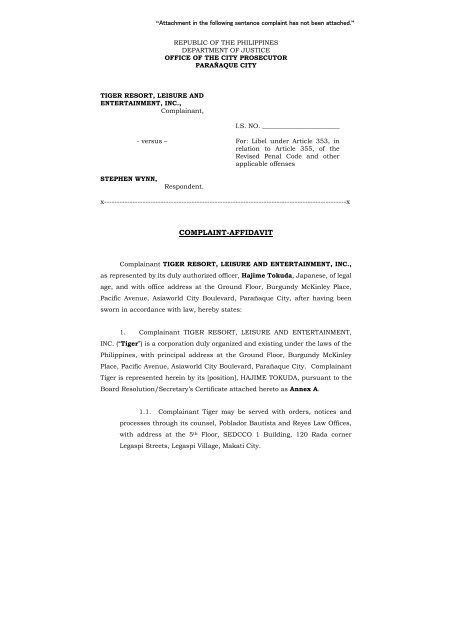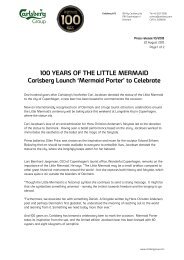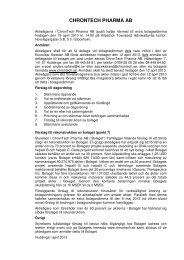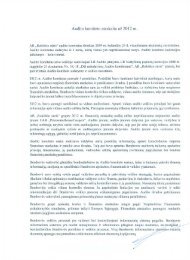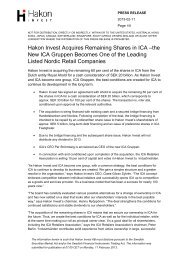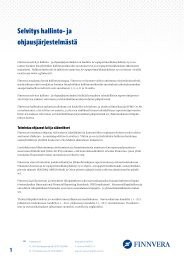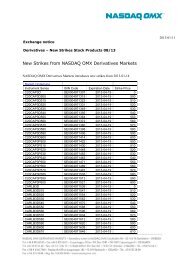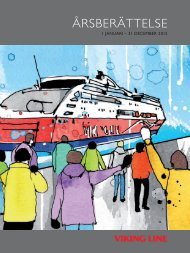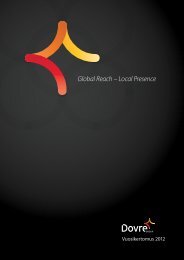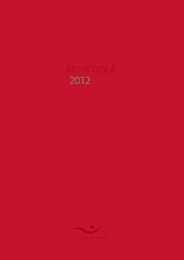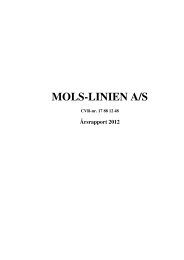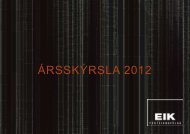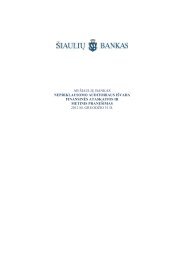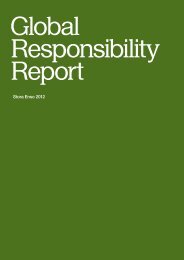COMPLAINT-AFFIDAVIT
COMPLAINT-AFFIDAVIT
COMPLAINT-AFFIDAVIT
- No tags were found...
You also want an ePaper? Increase the reach of your titles
YUMPU automatically turns print PDFs into web optimized ePapers that Google loves.
“Attachment in the following sentence complaint has not been attached.”REPUBLIC OF THE PHILIPPINESDEPARTMENT OF JUSTICEOFFICE OF THE CITY PROSECUTORPARAÑAQUE CITYTIGER RESORT, LEISURE ANDENTERTAINMENT, INC.,Complainant,I.S. NO. ________________________- versus –For: Libel under Article 353, inrelation to Article 355, of theRevised Penal Code and otherapplicable offensesSTEPHEN WYNN,Respondent.x----------------------------------------------------------------------------------------------x<strong>COMPLAINT</strong>-<strong>AFFIDAVIT</strong>Complainant TIGER RESORT, LEISURE AND ENTERTAINMENT, INC.,as represented by its duly authorized officer, Hajime Tokuda, Japanese, of legalage, and with office address at the Ground Floor, Burgundy McKinley Place,Pacific Avenue, Asiaworld City Boulevard, Parañaque City, after having beensworn in accordance with law, hereby states:1. Complainant TIGER RESORT, LEISURE AND ENTERTAINMENT,INC. (“Tiger”) is a corporation duly organized and existing under the laws of thePhilippines, with principal address at the Ground Floor, Burgundy McKinleyPlace, Pacific Avenue, Asiaworld City Boulevard, Parañaque City. ComplainantTiger is represented herein by its [position], HAJIME TOKUDA, pursuant to theBoard Resolution/Secretary’s Certificate attached hereto as Annex A.1.1. Complainant Tiger may be served with orders, notices andprocesses through its counsel, Poblador Bautista and Reyes Law Offices,with address at the 5 th Floor, SEDCCO 1 Building, 120 Rada cornerLegaspi Streets, Legaspi Village, Makati City.
22. Respondent STEPHEN A. WYNN (“Wynn”) is an American citizen, oflegal age, with office address at 3131 Las Vegas Boulevard, South, Las Vegas,Nevada 89109, U.S.A. Preliminary investigation may proceed against him, evenif he is not a resident of this country, pursuant to Section 3 (d) of Rule 112 of theRules of Criminal Procedure, which provides that “if the respondent cannot besubpoenaed, … the investigating officer shall resolve the complaint based on theevidence presented by the complainant.”Statement of Facts3. Complainant Tiger is a Philippine corporation whose primarycorporate purpose is “to acquire, own, maintain, operate and/or manage hotels(city and resort), inns, apartments, private clubs, pension houses, conventionhalls, lodging houses, restaurants, cocktail bars …, online gambling, casinos,gambling clubs, other similar recreational or amusement places …” A copy of itsAmended Articles of Incorporation is attached as Annex B hereof.4. Complainant Tiger is one of the companies of KAZUO OKADA (“Mr.Okada”), a Japanese national. Mr. Okada, through various companies, hasextensive business interests in the field of gaming and casino in Japan, theUnited States, the Philippines, and other countries. Among his companies areUNIVERSAL ENTERTAINMENT CORPORATION (“UEC”), a Japanese corporation;ARUZE USA, INC. (“Aruze”), a Nevada corporation; and herein complainant,Tiger. Complainant Tiger is a wholly-owned subsidiary of Aruze (see Tiger’s 2012General Information Sheet, attached as Annex B-1 hereof), but Aruze’sshareholdings have been transferred to another UEC subsidiary, UniversalEntertainment Hong Kong Limited, subject to the completion of registrationrequirements.5. In 2000, Mr. Okada contributed as much as US$380 million to acompany established by respondent Wynn, VALVINO LAMORE, LLC (“Valvino”).This company is the predecessor of WYNN RESORTS, LIMITED (“WynnResorts”). With his contribution, Mr. Okada thereby became an equal investorwith the respondent in Valvino/Wynn Resorts. Wynn Resorts, throughsubsidiaries, operates resort casinos in Las Vegas, Nevada, and in Macau,China.
35.1. Mr. Okada, through Aruze and UEC, owns approximately19.66% of the stock of Wynn Resorts. These shares were unlawfully andforcibly redeemed from him in an intra-corporate dispute that is currentlybeing questioned in the courts of Nevada, USA.5.2. Respondent is also a substantial stockholder of Wynn Resortsand its Chairman of the Board of Directors and Chief Executive Officer(CEO). As such, he has the most dominant voice and influence in themanagement of Wynn Resorts.5.3. Attached as Annex C hereof is a copy of the Complaint filed byMr. Okada and UEC, among others, against Mr. Wynn and Wynn Resorts,among others, before the Tokyo District Court (“Japan Complaint”). Thesaid Japan Complaint discusses matters in relation to Valvino and WynnResorts in relation to Mr. Okada and Mr. Wynn.6. Sometime in 2007, Mr. Efraim Genuino, former Chairman of thePhilippine Amusement and Gaming Corporation (“PAGCOR”), visited Japan andinvited Japanese companies to invest in casino and resort projects in thePhilippines. Mr. Okada began exploring the idea of investing and building acasino and hotel resort project in the Philippines. He invited respondent to joinhim in the project, seeing it as an opportunity for Wynn Resorts to make money.7. In the beginning, respondent appeared to be interested in thePhilippine project. However, he later changed his mind and said that WynnResorts was not interested in pursuing the project.8. Complainant Tiger became Mr. Okada’s investment vehicle for hisproject in the Philippines. In 2008, PAGCOR issued to complainant Tiger aProvisional License to develop, establish, and operate casinos within the BagongNayon Pilipino Manila Bay Tourism City.9. Meanwhile, a dispute arose between Mr. Okada and respondentinvolving, among others, Mr. Okada’s opposition to an anomalous donationpledged by Wynn Macau Limited, a Macau subsidiary of Wynn Resorts in Macau.
410. In 2011, Wynn Macau Limited pledged to donate a total ofUS$135,000,000 to the “University of Macau Development Foundation” over a12-year period to 2022. This would match the duration of the gaming concessiongranted to 2022 by the Macau government to Wynn Macau Limited in Macau.The said foundation is a financial organization which consists of governmentofficials and casino business operators in Macau.11. During a meeting of the Wynn Resorts Board of Directors, Mr. Okadavehemently objected to the donation. He also filed a petition with a Nevada statecourt questioning the approval of the donation. The case caught the attention ofthe U.S. Securities and Exchange Commission which commenced an “informalinquiry” into the matter.12. Mr. Okada’s actions did not sit well with respondent, as the latterfeared that an investigation would reveal that the purpose for the huge donationin Macau was improper and illegal. This prompted respondent Wynn to use thePhilippine project as a pretext to eliminate and take over Mr. Okada’sstockholdings (through UEC and Aruze), and remove him from Wynn Resorts.13. During a meeting of the Wynn Resorts Board of Directors inNovember 2011, respondent suddenly made false and malicious claims that thePhilippines is “awash in corruption” and that there were improprieties in Mr.Okada’s Philippine project.14. Mr. Okada immediately defended the Philippines. He provided theBoard members with materials showing that the Philippines has exceeded Indiaas the top outsourcing country; it is the only English-speaking society in Asia;top corporations from the USA and Japan have opened factories and businessesin the Philippines; the economic growth rate in the Philippines exceeds 8%; it is astrong country that is expected to experience high growth in the future; and thelike. Mr. Okada further argued that the Philippines has been properly governedas a democratic country by President Aquino, whose father was a democraticactivist, under a strong anti-corruption campaign.15. The Board meeting determined that Mr. Okada and his companiesmust have engaged in corrupt activities in connection with the Philippine project,based on the supposition that “the Philippines is a corrupt country” and further
5determined that Mr. Okada was to be dismissed from his position as ViceChairman of Wynn Resorts.16. Respondent thereafter hired Mr. Louis Freeh and his firm, FreehSporkin & Sullivan LLP (“Freeh LLP”), to conduct an investigation of the allegedcorrupt activities of Mr. Okada and his companies. The investigation was clearlyan afterthought and was commissioned for the purpose of providing justificationfor the baseless findings of the Compliance Committee.17. Mr. Freeh came up with a report 1 (the “Freeh Report”) which falselyclaimed, among others, that “Mr. Okada, his associates and companies appear tohave engaged in a longstanding practice of making payments and gifts to his two(2) chief gaming regulators at [PAGCOR], who directly oversee and regulate Mr.Okada’s Provisional Licensing Agreement to operate in that country. Since 2008,Mr. Okada and his associates have made multiple payments to and on behalf ofthese chief regulators, former PAGCOR Chairman Efraim Genuino andChairman Cristino Naguiat (his current chief regulator), their families andPAGCOR associates, in an amount exceeding US 110,000. At times, Mr. Okada,his associates and companies have consciously taken active measures to concealboth the nature and amount of these payments…” 2A copy of the Freeh Report is attached as Annex D hereof.18. Respondent maliciously caused copies of the Freeh Report to begiven to the press, which enabled several newspapers to publish the contents ofthe Freeh Report.19. On 19 February 2012, Wynn Resorts, under the direction andcontrol of respondent, maliciously issued a global press release, published on itswebsite, containing the following libelous accusations against Mr. Okada and hisassociates and companies, i.e., complainant Tiger, UEC, and Aruze (the “PressRelease”):a) “Freeh’s investigators uncovered and documented more thanthree dozen instances over a three-year period in which Mr.Okada and his associates engaged in improper activities fortheir own benefit in apparent violation of U.S. anti-corruption1 Annex D hereof.2 Freeh Report (Annex D), pages 1-2.
6laws and gross disregard for the Company’s Code of Conduct.These troubling discoveries include cash payments and giftstotaling approximately $110,000 to foreign gamingregulators.”b) “‘Mr. Okada and his associates and companies appear to haveengaged in a longstanding practice of making payments andgifts to his two chief gaming regulators at the PhilippinesAmusement and Gaming Corporation (PAGCOR), who directlyoversee and regulated Mr. Okada’s Provisional LicensingAgreement to operate in that county,’ according to the FreehReport. The report further stated that Mr. Okada and hisassociates have ‘consciously taken active measures to concealboth the nature and amount of these payments.”c) “Based on the Freeh Report, presented to the Wynn ResortsBoard of Directors on February 18, 2012 the Boarddetermined that Aruze USA, Inc., Universal EntertainmentCorporation and Mr. Okada are ‘unsuitable’ under theprovisions of the Company’s Articles of Incorporation.”d) “Pursuant to the finding of ‘unsuitability,’ the Board hadredeemed Aruze USA, Inc.’s 24 million Wynn Resorts’ shares.”A copy of the Press Release printed from a computer located in thePhilippines is attached hereto as Annex E.20. The Press Release was published by respondent on the website ofWynn Resorts with the intent that it be accessed in any part of the worldincluding the Philippines. As of the time of preparation of thisComplaint-Affidavit, the Press Release remains posted on Wynn Resorts’ website.21. The defamatory statements or imputations made by respondentagainst Mr. Okada, complainant Tiger, UEC and Aruze, are all malicious andfalse. Attached hereto as Annexes F to Q are news articles quoting interviewswith current PAGCOR Chairman Cristino Naguiat and other Philippinegovernment officials denying the claims made in the Freeh Report. The newsarticles show that there was no law violated by Mr. Okada, complainant Tiger,UEC, Aruze, or Chairman Naguiat, and that the PAGCOR officials were cleared ofany wrongdoing by the House Committee on Games and Amusements.21.1. The falsity of the defamatory statements is further discussedand demonstrated in the Japan Complaint (Annex C, supra). As showntherein, there is no basis to the allegation of violations of anti-corruption
7laws or other improper or illegal activities. Mr. Okada’s companies alsohave strict regulations prohibiting bribery, which are being firmlyenforced.22. The Freeh Report, which was heavily publicized in the Press Release,is clearly a one-sided, inaccurate, and unreliable report. Mr. Freeh improperlyand hastily conducted his investigation in his bid to provide respondent withsome colorable basis to kick out Mr. Okada from Wynn Resorts and seize hisstockholdings therein.22.1. Mr. Freeh subjected Mr. Okada to questioning about allegedlyimproper entertainment expenses in favor of PAGCOR officials and theirfamilies in Macau, without allowing Mr. Okada to prepare for the interviewand gather information from his subordinates who were the ones actuallyin charge of the day-to-day operations of the business. Mr. Freeh ignoredthe fact that Mr. Okada, being the Chairman and a Director of UEC, wasnot responsible for the execution of its day-to-day operations and had noknowledge of the matters inquired into by Mr. Freeh. At the time, UEC wasa company with committees, and directors did not conduct day-to-daybusiness operations.22.2. Mr. Okada informed Mr. Freeh that he would submit some ofthe information requested by the latter at a later date, after confirmationwith his subordinates. However, after only three (3) days and withoutwaiting for such information, Mr. Freeh rushed the Freeh Report andsubmitted the same to the Wynn Resorts Board of Directors, withoutallowing Mr. Okada to provide the necessary information and corrections.Clearly, the Freeh Report was inaccurate and incomplete and preparedwith undue haste.22.3. The serious flaws and defects in the Freeh investigation andthe Freeh Report are further discussed in the Japan Complaint (Annex C,supra). As shown therein, the methods used by Mr. Freeh were patentlyunfair to Mr. Okada and deprived him of his right to be fully heard on thematter. Mr. Freeh’s conclusions were also tentative, incomplete anduncertain, indicating that they lack any solid basis for such reckless andmalicious accusations.
823. The foregoing facts clearly reveal the plot by respondent to publiclyand maliciously attack the person and character of Mr. Okada, complainantTiger, UEC and Aruze and to tarnish their reputation in the eyes of the public.This was done to justify the forcible redemption and take-over of Aruze’s 19.66%stockholdings in Wynn Resorts, at an unreasonably discounted redemption pricethat is payable in 10 years.24. Due to respondent’s illegal acts, Mr. Okada, complainant Tiger, UECand Aruze suffered serious damage to their business, reputation and credibility.The stock price of UEC declined immediately after the issuance of the PressRelease. (See Japan Complaint, Annex C, supra.)25. It must also be noted that respondent’s actions, including theissuance of the Press Release, constitute a public, malicious and direct attack,not only on the person and character of Mr. Okada, complainant Tiger, UEC andAruze, but also on the integrity of the Republic of the Philippines, PresidentBenigno Aquino, Jr. and Philippine government officials. Respondent recklesslyand maliciously imputed in public that the Philippines is a corrupt country.The Elements of the Crime Committed26. Respondent’s act of publicly imputing corruption against Mr.Okada, complainant Tiger, UEC and Aruze constitutes the crime of libel asdefined in Article 353 of the Revised Penal Code (“RPC”), thus:“Art. 353. Definition of Libel. — A libel is a public andmalicious imputation of a crime, or of a vice or defect, real orimaginary, or any act, omission, condition, status, or circumstancetending to cause the dishonor, discredit, or contempt of a natural orjuridical person, or to blacken the memory of one who is dead.”27. The elements of libel are as follows: 3a) Imputation of a discreditable act or condition to another;b) Publication of the imputation;3 Daez v. Court of Appeals, G.R. No. 47971, 31 October 1990, 191 SCRA 61, 67; Binay vs.Secretary of Justice, G.R. No. 170643, September 8, 2006.
9c) Identity of the person defamed; andd) Existence of malice.All of these elements are present in this case.First Element: Imputation of adiscreditable act or condition toanother28. Under Article 353 of the Revised Penal Code, there must be an“imputation of a crime, or of a vice or defect, real or imaginary, or any act,omission, condition, status, or circumstance tending to cause the dishonor,discredit, or contempt of a natural or juridical person.”29. As explained above, respondent, through the Press Release, imputedthat Mr. Okada and his companies, including complainant Tiger, UEC, andAruze, had engaged in corrupt activities with the gaming authority officials in thePhilippines:“Freeh’s investigators uncovered and documented more thanthree dozen instances over a three-year period in which Mr. Okadaand his associates engaged in improper activities for their ownbenefit in apparent violation of U.S. anti-corruption laws andgross disregard for the Company’s Code of Conduct. These troublingdiscoveries include cash payments and gifts totalingapproximately $110,000 to foreign gaming regulators.“‘Mr. Okada and his associates and companies appear tohave engaged in a longstanding practice of making paymentsand gifts to his two chief gaming regulators at the PhilippinesAmusement and Gaming Corporation (PAGCOR), who directlyoversee and regulated Mr. Okada’s Provisional Licensing Agreementto operate in that county,’ according to the Freeh Report. The reportfurther stated that Mr. Okada and his associates have ‘consciouslytaken active measures to conceal both the nature and amount ofthese payments.”30. Such imputations of corrupt activities are clearly discreditable anddishonorable. 4 They are an affront to the reputation, honor, and integrity of Mr.Okada, complainant Tiger, UEC and Aruze. Indeed, respondent’s imputationsare so dishonorable that some lawmakers were deeply offended and called for a4 See Daez v. Court of Appeals, G.R. No. 47971, 31 October 1990, 191 SCRA 61, involving animputation of corruption.
10“ban” against respondent from the country. 5Second Element: Publication ofImputation31. For purposes of libel, the element of publication simply means thecommunication of the defamatory matter to some third person or persons. 6“Publication means ‘to make public; to make known to people in general; tobring before the public.’ Specifically put, publication in the law of libel meansthe making known of the defamatory matter, after it has been written, to someperson other than the person of whom it is written.” 732. In this case, the defamatory Press Release was certainly madeknown to the public as it was released and posted on the website of WynnResorts, with the intent to make it accessible, as it was in fact made accessible toother countries, including the Philippines. By its very nature as a “PressRelease”, it was intended to be disseminated and propagated. Since thedefamatory material is posted on the website, it is accessible all over the world,including the Philippines. It is therefore punishable here.33. Publication via the internet is still publication for purposes of libel.What is essential is that the defamatory matter be communicated or madeknown, regardless of the means by which it is communicated or made known.Article 355 penalizes “libel committed by means of writing, printing, lithography,engraving, radio, phonograph, painting, theatrical exhibition, cinematographicexhibition, or any similar means.” While the internet is not expresslymentioned in Article 355, it may be considered as “similar means” to the othermedium mentioned therein. Like them, the internet is a medium used forcommunicating to the general public. Relatedly, jurisprudence holds that libelcan be committed by television, although television is not expressly mentionedamong the means specified in Article 355. Television qualifies under the generalprovision “or any similar means.” 8 In U.S. vs. Go Chico, 9 the Supreme Court held5 See article entitled “Lawmakers rally round Pagcor, move to ban Wynn,” Philippine DailyInquirer, February 28, 2012 (Annex __ hereof).6 Luis B. Reyes, The Revised Penal Code, Vol. II (14 th Ed.), page 924, citing People vs. Atencio,CA-G.R. Nos. 11351-R to 11353-R, December 14, 1954.7 Alonzo vs. Court of Appeals, G.R. No. 110088, February 1, 1995.8 Luis B. Reyes, The Revised Penal Code, Vol. II (14 th Ed.), page 951, citing People vs. Casten,CA-G.R. No. 07924-R, December 13, 1974.9 14 Phil. 128 (1909).
11that statutes, including penal ones, must be reasonably construed to givemeaning to the legislative intent:“The statute, then, being penal, must be construed with suchstrictness as to carefully safeguard the rights of the defendants andat the same time preserve the obvious intention of thelegislature. x x x“It is said that notwithstanding this rule (that penalstatutes must be construed strictly) the intention of thelawmakers must govern in the construction of penal as well asother statutes. This is true, but this is not a new, independent rulewhich subverts the old. It is a modification of the known maxim andamounts to this — that though penal statutes are to be construedstrictly, they are not to be construed so strictly as to defeat theobvious purpose of the legislature. (U.S. vs. Wiltberger, 5 Wheat.,76; Taylor vs. Goodwin, L.R. 4, Q.B. Div., 228.)“In the latter case it was held that under a statute whichimposed a penalty for ‘furiously driving any sort of carriage’ a personcould be convicted for immoderately driving a bicycle.“It is presumed that the legislature intends to impart to itsenactments such a meaning as will render them operative andeffective, and to prevent persons from eluding or defeatingthem. Accordingly, in case of any doubt or obscurity, theconstruction will be such as to carry out these objects.”Similarly, in People vs. Manantan, 10 it was held that “[t]he strictconstruction of a criminal statute does not mean such construction of it as todeprive it of the meaning intended. Penal statutes must be construed in thesense which best harmonizes with their intent and purpose.”34. In libel, the gravamen of the offense is the defamation or the injurycommitted against a person’s honor or reputation. This is the evil that thelegislature sought to punish. The means used to defame or injure reputation issecondary.35. The 2010 case of Bonifacio vs. RTC Makati, Branch 149 11 involvedlibel committed through the internet where, as in this case, defamatory materialswere posted on a website. The Supreme Court ruled that the venue for a libelcase is “limited to only either of two places, namely: 1) where the complainantactually resides at the time of the commission of the offense; or 2) where the10 G.R. No. L-14129, July 31, 1962.11 G.R. No. 184800, May 5, 2010.
12alleged defamatory article was printed and first published.” The prosecutionchose the second option, on the theory that the place where the website was firstaccessed by the offended party is the place of first publication. The SupremeCourt rejected the said position. By clear implication, however, venue for internetlibel may still be laid using the first option: the place “where the complainantactually resides at the time of the commission of the offense.” (Applying this tothe present case, the venue of a libel action by complainant Tiger may be laid inParañaque City, where Tiger has its residence or principal office as stated in itsAmended Articles of Incorporation. 12 )36. It is notable that in the aforementioned Bonifacio case, the SupremeCourt never ruled out that libel can be committed by means of the internet.37. In fact, the recent enactment of Republic Act (RA) No. 10175, or the“Cybercrime Prevention Act of 2012,” confirms that libel under the Revised PenalCode may be committed through a computer system. RA 10175 increases thepenalty for libel committed through the internet by making it one degree higherthan that provided in the Revised Penalty Code. RA 10175 pertinently provides:“SEC. 4. Cybercrime Offenses. — The following acts constitutethe offense of cybercrime punishable under this Act:x x x(c)Content-related Offensesx x x(4) Libel — The unlawful or prohibited acts of libel asdefined in Article 335 of the Revised Penal Code, as amended,committed through a computer system or any othersimilar means which may be devised in the future.”x x x“SEC. 6. All crimes defined and penalized by Revised PenalCode, as amended, and special laws, if committed by, through andwith the use of information and communications technologies shallbe covered by the relevant provisions of this Act. Provided, That thepenalty to be imposed shall be one (1) degree higher than thatprovided for by the Revised Penal Code, as amended and speciallaws, as the case may be.”12 Annex B hereof.
13Section 4(c)(4) and Section 6 quoted above in fact clearly imply that there is“libel as defined in Article 335 of the Revised Penal Code” and “crimes definedand penalized by Revised Penal Code … through and with the use of informationand communications technologies.” RA 10175 operates only to increase thepenalty for such crimes as provided in the Revised Penal Code.38. RA 10175 further clarifies that the Philippines has territorialjurisdiction over crimes committed by means of the internet or computer system,as long as one of the elements of the offense is committed in the Philippines orwhen the person damaged is in the Philippines, thus:“SEC. 21. Jurisdiction. — The Regional Trial Court shall havejurisdiction over any violation of the provisions of this Act includingany violation committed by a Filipino national regardless of the placeof commission. Jurisdiction shall be if any of the elements wascommitted within the Philippines or committed with the use ofany computer system wholly or partly situated in the country orwhen by such commission any damage is caused to a natural orjuridical person who, at the time the offense was committed,was in the Philippines. x x x”39. It is therefore clear that Philippine courts have jurisdiction over thelibel committed by respondent since the element of damage took place in thePhilippines, where complainant Tiger is incorporated and where it holds its placeof business. Since complainant Tiger is a Philippine corporation doing businessin the Philippines, a libel committed against it injures its reputation in thePhilippines. Damage (in the form of discredit or dishonor or injury to reputation)is thus suffered in the Philippines, and the Philippine legal system therefore hasterritorial jurisdiction over the offense.40. While the implementation of RA 10175 was put on hold by theSupreme Court’s issuance of a Temporary Restraining Order, the Primer onCybercrime issued by the Department of Justice on 26 November 2012 providesthat “as of the moment, cybercrime-related cases are dealt with using existinglaws.” This means that internet libel may be “dealt with” or prosecuted under theexisting provisions of the RPC on libel.Third Element: Identity of PersonDefamed
1441. It is settled that “in order to maintain a libel suit, it is essential thatthe victim be identifiable although it is not necessary that he be named.” 13Complainant Tiger, while not named in the defamatory Press Release, is clearlyidentifiable therein. The Press Release states:“‘Mr. Okada and his associates and companies appear tohave engaged in a longstanding practice of making payments andgifts to his two chief gaming regulators at the PhilippinesAmusement and Gaming Corporation (PAGCOR), who directlyoversee and regulated Mr. Okada’s Provisional LicensingAgreement to operate in that county,’ according to the FreehReport. The report further stated that Mr. Okada and his associateshave ‘consciously taken active measures to conceal both the natureand amount of these payments.”42. The foregoing mentions “Mr. Okada and his associates andcompanies” in connection with PAGCOR and the “Provisional LicensingAgreement” to operate in the Philippines. Clearly, complainant Tiger is beingreferred to because it is the company of Mr. Okada in the Philippines that wasgranted by PAGCOR with a Provisional License to operate in the Philippines.Fourth Element: Existence of Malice43. Article 354 of the Revised Penal Code provides that “Everydefamatory imputation is presumed to be malicious, even if true, if no goodintention and justifiable motive for making it be shown x x x” In other words,when the imputation is defamatory (as in this case), the prosecution need noteven prove malice on the part of the respondent, because the law presumes thatsuch defamatory imputation is malicious (“malice in law”). “No evidence aliundeneed be adduced to prove it [i.e., malice]. x x x [T]he burden is upon thedefendant to overcome the legal inference of malice.” 1444. In this case, malice is not only presumed from the defamatorynature of respondent’s imputations; it is also evident from the circumstances ofthe case. In other words, there is not only malice in law (which is sufficient initself); there is also malice in fact. “[M]alice in fact is a positive desire and13 Borjal vs. Court of Appeals, G.R. No. 126466, January 14, 1999. See also Corpus vs.Cuaderno, Sr. (16 SCRA 807)14 People vs. Monton, G.R. No. L-16772, November 30, 1962.
15intention to annoy and injure. It may denote that the defendant was actuated byill will or personal spite. It is also called express malice, actual malice, realmalice, true malice, or particular malice.” 1545. As shown above, respondent’s actions were prompted by ill-will,spite, and ulterior motives. They were deliberately done to tarnish the reputationof Mr. Okada and his companies, including complainant Tiger, as part of a grandscheme to forcibly redeem and take over Mr. Okada’s stockholdings in WynnResorts, remove him from the Board of Directors of Wynn Resorts, and preventfurther investigation into the anomalous US$135 million donation made byWynn Resorts to the University of Macau Development Foundation.46. Based on all the foregoing, it is clear that respondent should becharged with the crime of libel under Article 353, in relation to Article 355, of theRevised Penal Code.47. The undersigned affiant is executing this Complaint-Affidavit onbehalf of complainant Tiger to attest to the truth of the foregoing statements, forthe purpose of instituting criminal proceedings against respondent StephenWynn for the crime of libel under Article 353, in relation to Article 355, of theRevised Penal Code, and any other applicable crimes as may be determined bythis Honorable Office. This is without prejudice to the filing of a complaint underRepublic Act No. 10175.By:TIGER RESORT, LEISURE ANDENTERTAINMENT, INC.ComplainantHAJIME TOKUDAAffiant15 Yuchengco vs. Manila Chronicle, G.R. No. 184315, November 25, 2009.
16CERTIFICATIONSUBSCRIBED AND SWORN to before me this ______ day of December 2012at Parañaque City.I hereby certify that I have personally examined the Affiant and that I amsatisfied that he voluntarily executed and understood the foregoingComplaint-Affidavit.Assistant City Prosecutor1657.10.01Jcp/Invest Asia/Complaint-Affidavit Tiger vs. Wynn December 10


